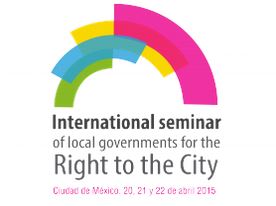
Final Declaration
Coming together in Mexico City from
20th to 22nd April 2015, representatives of Local Government come
from all around the world, members of United Cities and Local Governments, of
Mercociudades, of World Forum of Peripheral Local Authorities for solidarity –
based metropolises, representatives of civil society and popular urban
movements, part of the Global Platform for the Right to the City, in the
presence of more than four thousands and five hundred inhabitants of Mexico
City, we affirm our commitment for the Right to the City.
In 2050, seventy percent of the
world population will live in cities. It means that in thirty years, more than
two billions of people will move to cities, especially to the biggest
metropolitan ones. In a world where only 1% of the population owns more than
half of the wealth, urban areas are the focus of unsustainable tensions and
inequalities.
In this context, Local governments
and their inhabitants are urgently claiming for the Right to the City as a
necessary approach to build a fair, inclusive, democratic and sustainable urban
world.
In line with the 1st World Summit of
Local Governments for the Right to the City of SaintDenis in 2012 and inspired
by Mexico City Charter for the Right to the City (The European Charter for the
Safeguarding of Human Rights in the City (Saint Denis, 2000), Montreal Charter
(2006), Vienna Charter (2012), Gwangju Guiding Principles for Human Rights
Cities (2012) and the Global Charter-Agenda for Human Rights in the City
adopted by UCLG in 2011, Local governments and their citizens, in the wide
variety of their situations, do reaffirm their essential role as actors for the
guarantee of civil, politics, social, economic, cultural and environmental
rights.
The Right to the City is an individual
and collective right for all inhabitants, in which territories of the cities
and their hinterlands are conceived as spaces for the exercise and fulfillment
of rights as a way for people to enjoy resources, services, goods and
opportunity that the city brings in a fair, universal, democratic and
sustainable way. In that way, Right to the City implies:
– Cities where the full exercise of
human rights is guaranteed for all inhabitants
– Democratic, transparent, and
participatory cities based on citizens’ empowerment
– Cities as common goods for all
inhabitants, where human rights take precedence over process of privatization,
of speculation which necessarily involve the exclusion of the majority of the
population, and where the rehabilitation of the historic center avoid
gentrification
– Sustainable cities which maintain
a balance and a respectful relation with the rural world around them and its
natural resources
– Cities where economy aims to
ensure well-being of inhabitants, and are based on endogenous and sustainable
local economic development and on local resources without looking for
attracting international investments first
– Multicultural and welcoming cities
highlighting the wealth of migrants
– Cities where public spaces are
accessible for all and recognized as necessary for the freedom of expression,
and the various uses of the city
– Cities where cultural rights are
guaranteed as a key for social inclusion In big metropolises, these principles should
be applied through the building of polycentric metropolises, built with
peripheries and not with a centralist focus.
We are convinced that Local
governments, are daily working, through their public policies and with the
participation of their inhabitants, to “contribute to build inclusive, livable,
fair, democratic, sustainable and enjoyable cities; to impulse social
organization processes, strengthening social cohesion and building active and
responsible citizenship; contribute to build fair, inclusive and
solidarity-based urban economy capable to guarantee productive inclusion and to
enhance popular economic sectors.” (Mexico City Charter for the Right to the
City).
We want cities for all, based on
social and spatial justice, without visible or invisible boundaries, and where
collective good living is guaranteed.
In one and a half year, States of
the whole world will meet at UN-Habitat Summit on Housing and Sustainable
Development (Quito, October 2016) to define a New Global Urban Agenda. We want
the Right to the City to be recognized in this agenda as an alternative to the
overwhelming urban narrative based on the rise of big metropolises in
competition. Goals, measures, indicators, and tools for the implementation of
the Right to the City at the global, regional and local level are needed to be
included in the future Habitat Agenda.
Furthermore, we ask UN-Habitat to
guarantee an effective participation of Local Governments and their
associations in collaboration with civil society in the preparation,
organization, and the realization of the Habitat III Summit. We call for a
joint effort of States, Local Governments, Academic Sectors and popular and
citizens’ urban movement to fulfill the objectives of this declaration.
Finally, we call for a strong common
action of cities and the members of UCLG that share the commitment for the
Right to the City in order to make this reflection and the recognition of the
Right to the City progress into UCLG, through our common tool: the Committee on
Social Inclusion, Participatory Democracy and Human Rights.
Mexico City, 22 April 2015